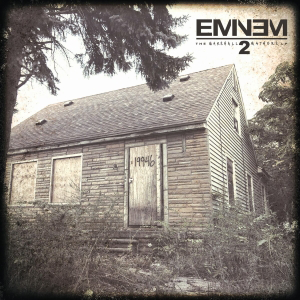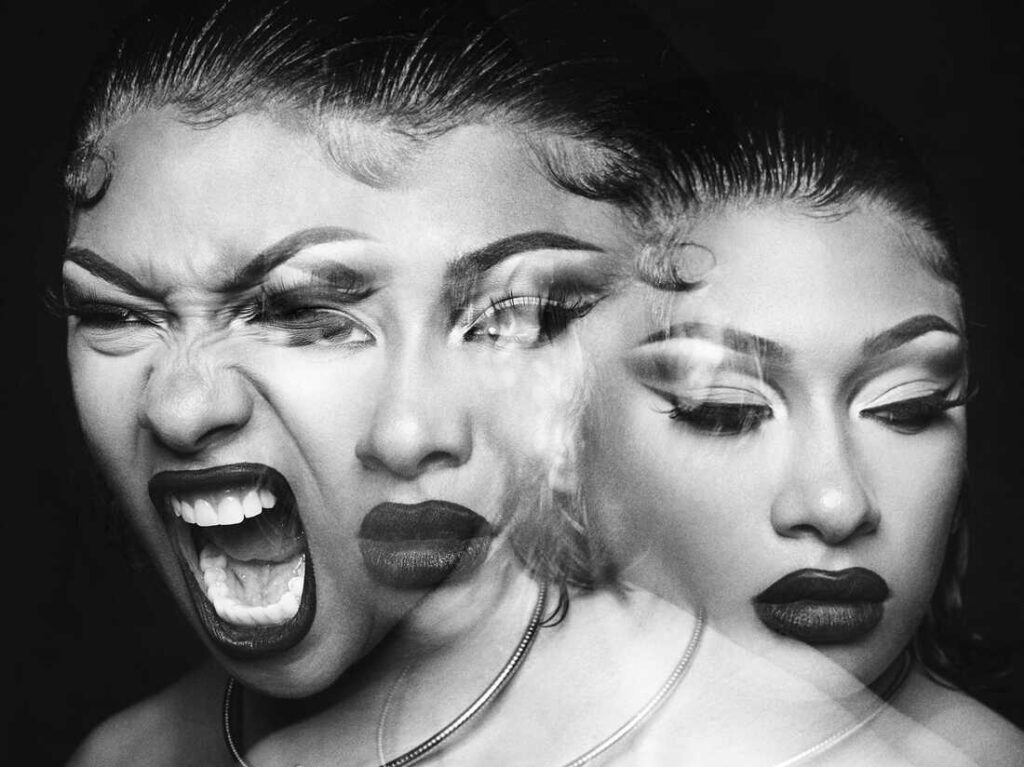Album Review: Eminem – “Marshall Mathers LP 2”
Written by Coog Radio on November 15, 2013
 The era of the mid to late ’90s was worth witnessing. It was worth the craze of pop stars like N’Sync and Britney Spears. It was worth hearing these artists boom across the nation, and when Total Request Live was on MTV, the station was worth tuning in.
The era of the mid to late ’90s was worth witnessing. It was worth the craze of pop stars like N’Sync and Britney Spears. It was worth hearing these artists boom across the nation, and when Total Request Live was on MTV, the station was worth tuning in.
Of course, this era also came with the appearance of the crudely flamboyant and controversial Detroit rapper Eminem. Compounded with his ever-so-funny superhero suit music videos, the unsheathing of his dysfunctional family issues and his take on political conundrums, his viciously poetic and pun-heavy rhymes made every middle- to high-school male want to bleach their hair. Indeed, he was worth more than just a glance.
However, much like our pop music darlings of yesterday, his overall presence in hip-hop and pop culture standing has drastically waned. While “The Slim Shady LP,” “The Marshall Mathers LP” and “The Eminem Show” serve as monumental projects that put his personal issues and alter ego on the table, projects like “Relapse” and “Recovery” were disappointing and lacking.
Alongside super-producers Dr. Dre and Rick Rubin, Eminem sets out to reclaim his throne in hip-hop with the second branch of his earlier work, the “Marshall Mathers LP 2.” On the surface, the 16-track package encompasses bits of every musical stage Eminem has gone through. Some songs on this album sound like they were inspired by his earlier work, while others sound like “Recovery” and “Relapse” rejects.
The most standout songs, of course, cater to a more grounded hip-hop audience, and more specifically ones that appeal to fans accustomed to his earlier style. The opener of the album, “Bad Guy,” hits the nail on the head, acting as a continued chapter from the popular and gripping single “Stan” in 1999. Eminem takes on the role of Stan’s little brother Mathew Mitchell, who sets out to exact revenge for the death of his brother by killing Mathers.
“Rhyme or Reason” and “So Far” also take us back to the Slim Shady days, as his shrewd, comedic character comes hurling at the listener as if it was taken straight from his past.
Eminem also doesn’t miss a beat on his lyricism either, and as we evidently hear through the latter track, we find that his aggravation with his aging and the negative aspects of fame are still quite heavy. The Joe Walsh sample in Rubin’s production and Eminem’s humoristic drive make the song charming and superb.
“Rap God” and “Evil Twin” also cater to the hip-hop elements that many of his newer fans would kill to hear. Although still relentless on misogynistic, rape-themed and homophobic lyrics in his verses, his enthusiasm and smash-mouth rhyme schemes on both tunes are godlike.
In “Evil Twin,” the concept of having Slim Shady and Eminem rap on different verses is smart and electrifying. Eminem also points out his age in this song again, saying that there is no N’Sync or Backstreet Boys to attack with his verses.
While these tracks certainly help satiate the need for Eminem’s ruckus, most of the other tracks on the albums that feature female hooks are the very same ones that should have been kept away from this album. “Legacy,” for example, takes listeners through memory lane, dealing with Mathers’ past and successfully making it in his present career, but the cheesy lines and the atrocious-sounding hook on this song are far from legendary.
“A—hole” and “Stronger Than I Was,” a song featuring Eminem’s vocals throughout the entire track, are also not worth a second listen because of the same problems as “Legacy.” Eminem definitely wants to keep pushing the pop-rap side of his artistry, and he executes that flawlessly with “The Monster,” featuring Rihanna, and “Survival.” The hooks on those tracks aren’t as bad as the other two, but they hastily get old.
“Headlights” is a strange song. Album after album, Eminem had rapped about his hate for his mother and blamed her for a lot of ill happenings in his childhood. This track, however, marks the only time that we ever really hear Eminem’s affectionate feelings toward her, as he takes back the blame that he previously laid upon her. While it’s absolutely commendable for Mathers to make a track for his mom rather than against her, it does play a little trick on his fans’ nostalgia.
Perhaps that’s the problem with this album: Eminem hasn’t matured, and because of that, some of the tracks on this album feel like he’s desperately holding onto the nostalgia that we all remember. In reality, many of his fans have moved on. Trying to come back to that same nostalgia is like asking listeners to be 10-year-olds again.
He’s still the over-the-top lyricist who isn’t afraid to hit below the belt, which is enough to possibly allow him back onto the unspoken throne of hip-hop. However, “Marshal Mathers LP 2” isn’t Eminem’s best work. The lyricism and concepts on this album are on-point, but it also possesses a lot of disjointedness and unbearable pop-rap filler tracks.
This article was originally published by The Daily Cougar and written by Bryan Dupont-Gray, who is also a DJ for Coog Radio.
BY: Bryan Dupont-Gray



